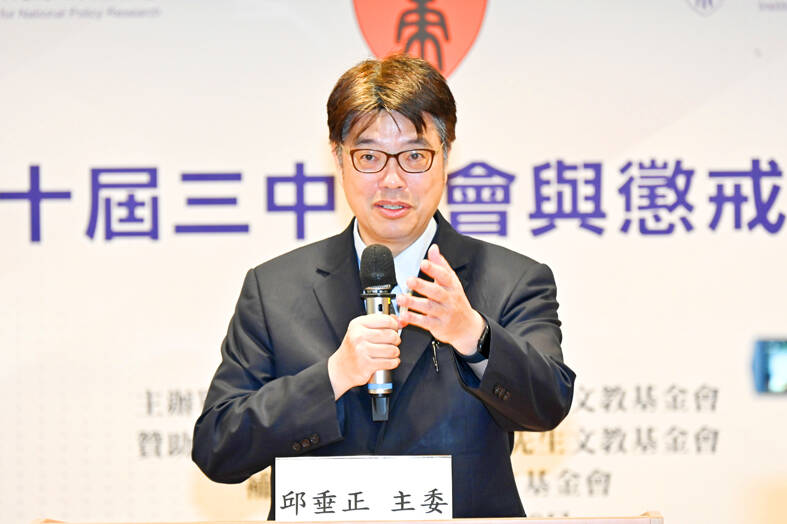Mainland Affairs Council Minister Chiu Chui-cheng (邱垂正) and academics yesterday weighed the impact of a top-level meeting in Beijing, largely agreeing on a negative outlook for China’s economic and political future.
Chiu made the comment at a conference in Taipei on China’s Third Plenum.
The Chinese official meeting, typically held once every five years, is today scheduled to conclude, with Chinese officials expected to publish records of the proceedings in the following days.

Photo: Tu Chien-rong, Taipei Times
This year’s Third Plenum is mainly focused on deepening reforms and promoting “modernization with Chinese characteristics,” Chiu said, citing Beijing’s official statements.
Chinese authorities appeared concerned with the flight of Western investors and China’s aging population, he said, adding that Beijing believed wealth redistribution and tax reforms could address the problems.
Tamkang University associate professor of China studies Chang Wu-ueh (張五岳) said this year’s meeting emphasized developing national security over the economy, marking a break from former Chinese leader Deng Xiaoping’s (鄧小平) paradigm that has been in effect since 1978.
Citing China’s official directive to deepen reforms and modernization, he said China’s important economic indicators are not likely to improve in the short term.
Anson Hung (洪耀南), an associate professor of international relations at Tamkang University, said the Third Plenum did not offer solutions to China’s economic woes beyond Chinese Premier Li Qiang’s (李強) remedial policies.
The lack of vision in the Third Plenum put Chinese President Xi Jinping’s (習近平) leadership in an unfavorable light, despite a propaganda campaign to prop him up as Deng’s equal, he said.
National Taiwan University researcher Ming Chu-cheng (明居正) said China’s economy is facing the inevitable problems that all advanced economies must face, the rise in the cost of property, labor, water and electricity.
A US technology blockade has caused a bottleneck in China’s technological development, he said.
Beijing has also experienced self-inflicted wounds from the crackdown in Hong Kong, overzealous COVID-19 measures, expanding state-owned enterprises and contracting private enterprises, and a trade dispute with the US, he said.
Xi’s most significant move was undoing Deng’s reform in a bid to reassert communist party control over the Chinese society and economy, he said.
These reforms would likely increase Beijing’s totalitarian tendencies and the cult of personality surrounding Xi, Ming said.
Xi’s efforts to strengthen social control stemmed entirely from the belief that the US would initiate or precipitate a war against China, he said.
China’s problems would likely prove intractable for at least two decades, as they were symptoms of political interference in the economy, Ming said, adding that Beijing is at risk of creating a caged economy.

Chinese spouse and influencer Guan Guan’s (關關) residency permit has been revoked for repeatedly posting pro-China videos that threaten national security, the National Immigration Agency confirmed today. Guan Guan has said many controversial statements in her videos posted to Douyin (抖音), including “the red flag will soon be painted all over Taiwan” and “Taiwan is an inseparable part of China,” and expressing hope for expedited reunification. The agency last year received multiple reports alleging that Guan Guan had advocated for armed reunification. After verifying the reports, the agency last month issued a notice requiring her to appear and explain her actions. Guan

The Kaohsiung Tourism Bureau audited six hotels in an effort to prevent price gouging ahead of Korean band BTS’ concert tour in the city scheduled for Nov. 19, 21 and 22 this year. The bureau on Friday said that the audits — conducted in response to allegations of unfair pricing posted on social media — found no wrongdoing. These establishments included the local branches of Chateau de Chine, Hotel Nikko, My Humble House, and Grand Hai Lai, it said, adding that the Consumer Protection Commission would have penalized price gougers had the accusations been substantiated. The bureau said the Tourism Development Act

GIVE AND TAKE: Blood demand continues to rise each year, while fewer young donors are available due to the nation’s falling birthrate, a doctor said Blood donors can redeem points earned from donations to obtain limited edition Formosan black bear travel mugs, the Kaohsiung Blood Center said yesterday, as it announced a goal of stocking 20,000 units of blood prior to the Lunar New Year. The last month of the lunar year is National Blood Donation Month, when local centers seek to stockpile blood for use during the Lunar New Year holiday. The blood demand in southern Taiwan — including Tainan and Kaohsiung, as well as Chiayi, Pingtung, Penghu and Taitung counties — is about 2,000 units per day, the center said. The donation campaign aims to boost

BACK TO WINTER: A strong continental cold air mass would move south on Tuesday next week, bringing colder temperatures to northern and central Taiwan A tropical depression east of the Philippines could soon be upgraded to be the first tropical storm of this year, the Central Weather Administration (CWA) said yesterday, adding that the next cold air mass is forecast to arrive on Monday next week. CWA forecaster Cheng Jie-ren (鄭傑仁) said the first tropical depression of this year is over waters east of the Philippines, about 1,867km southeast of Oluanpi (鵝鑾鼻), and could strengthen into Tropical Storm Nokaen by early today. The system is moving slowly from northwest to north, and is expected to remain east of the Philippines with little chance of affecting Taiwan,